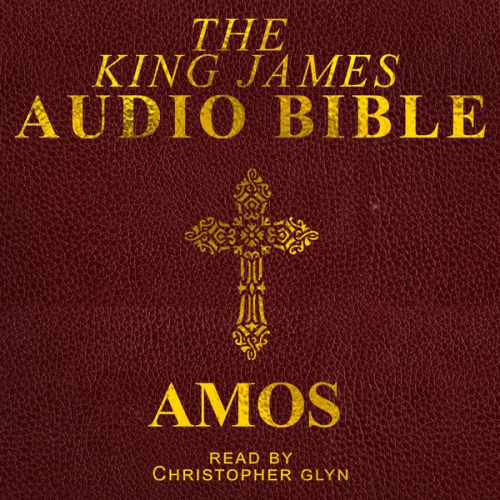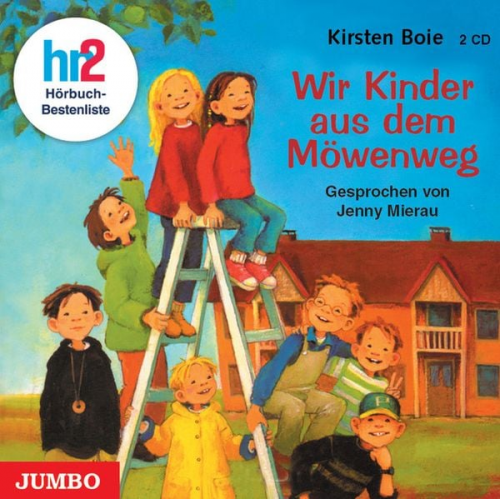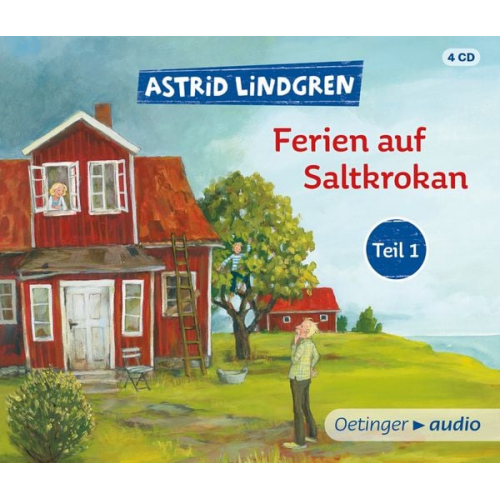
Christopher Glyn - Amos
0,99 €
The Book of Amos is one of the Twelve Minor Prophets in the Hebrew Bible and the Old Testament. Amos, a shepherd and fig tree farmer from the southern kingdom of Judah, is called by God to prophesy to the northern kingdom of Israel during the reign of Jeroboam II,...
Direkt bei Thalia AT bestellenProduktbeschreibung
The Book of Amos is one of the Twelve Minor Prophets in the Hebrew Bible and the Old Testament. Amos, a shepherd and fig tree farmer from the southern kingdom of Judah, is called by God to prophesy to the northern kingdom of Israel during the reign of Jeroboam II, a time of significant prosperity and expansion but also of rampant injustice and idolatry. This setting places Amos's ministry in the 8th century BCE, making him one of the earliest prophets whose writings are included in the Bible. Amos's message is one of judgment and warning to Israel and its surrounding nations. He begins by pronouncing judgment on Israel's neighbors for their various acts of brutality and injustice, but quickly turns his focus inward, condemning Israel itself for similar sins: oppression of the poor, corruption in the judiciary, sexual immorality, and especially the worship of foreign gods alongside or in place of Yahweh, which had been facilitated by the wealth and complacency of the people. A central theme of Amos is social justice, with the prophet vehemently criticizing the exploitation of the poor and vulnerable by the wealthy elite. He denounces Israel's religious practices, particularly the lavish rituals and sacrifices, as hypocritical and unacceptable to God when justice and righteousness are neglected. Amos famously declares, "But let justice roll on like a river, righteousness like a never-failing stream!" (Amos 5:24, NIV), emphasizing that true worship of God is demonstrated through ethical living and social justice. Another significant aspect of Amos's prophecies is the concept of the Day of the Lord, a theme that recurs throughout the prophetic books. Initially thought of as a time when God would deliver Israel from its enemies, Amos reinterprets it as a day of darkness and not light—a time of judgment, not only for the nations surrounding Israel but for Israel itself because of its unfaithfulness and injustice. Despite its stern warnings and grim predictions, including the eventual exile of the people from their land, the book concludes with a note of hope. Amos speaks of a future restoration for the people of Israel, a time when the ruins will be rebuilt, and the people will once again enjoy the fruits of their land under the reign of David's restored dynasty. This vision points forward to a time of spiritual renewal and restoration, emphasizing God's enduring commitment to His covenant people despite their failures. The Book of Amos remains relevant today, calling readers to reflect on the importance of justice, righteousness, and true worship in their communities and personal lives. It challenges the faithful to consider how their actions reflect their commitment to God and to pursue a life that embodies justice and righteousness.
| Marke | Whitestone Media |
| EAN | 9781909271364 |
Kategorien
- « Autoreifen
- Beautywelt
-
« Bücher
-
« Schule & Lernen
- « Schulbücher
- « Lernhilfen
- « Lektüren & Interpretationen
- « Sprachen lernen
- « Berufs- & Fachschulen
- « Lexika & Wörterbücher
- « Lehrermaterialien
- Hausaufgabenhefte
- « Formelsammlungen
- Schultüten basteln
-
« Fremdsprachige Bücher
-
« Englische Bücher
- « Schule & Lernen
- « Reise & Abenteuer
- « Sach- & Fachbücher
- « Ratgeber & Freizeit
- « Kinder- & Jugendbücher
- « Klassiker
- « Romane & Erzählungen
- « Krimis & Thriller
- « Comics & Mangas
- « Preisgekrönte Bücher
- « Fantasy
-
« Nach Autoren
- Moyes, Jojo
- Alice Oseman
- Hoover, Colleen
- Sally Rooney
- Tolkien, John R. R.
- Emily Henry
- Karen M. McManus
- Grisham, John
- Matt Haig
- Ana Huang
- Mo Xiang Tong Xiu
- Ali Hazelwood
- Taylor Jenkins Reid
- Roberts, Nora
- Aaronovitch, Ben
- James, E. L.
- Collins, Suzanne
- Sparks, Nicholas
- Brown, Dan
- Flynn, Gillian
- Beckett, Simon
- Rowling, Joanne K.
- Baldacci, David
- Martin, George R. R.
- Slaughter, Karin
- Carr, Robyn
- Roth, Veronica
- Follett, Ken
- Cassandra Clare
- McDermid, Val
- Child, Lee
- Gerritsen, Tess
- Nesbo, Jo
- Todd, Anna
- Gardner, Lisa
- Preston, Douglas
- Clancy, Tom
- Phillips, Susan Elisabeth
- Adler-Olsen, Jussi
- French, Nicci
- Jackson, Lisa
- Rendell, Ruth
- Forsyth, Frederick
- Gordon, Noah
- Archer, Jeffrey
- Wiggs, Susan
- George, Elizabeth
- Carlan, Audrey
- Feehan, Christine
- Mallery, Susan
- McFadyen, Cody
- Phillips, Carly
- « Science Fiction
- « BookTok
- New Adult
- Weitere Themenbereiche
- « Besondere Ausgaben
- Barack Obamas Reading List
- Russische Bücher
- « Italienische Bücher
- « Niederländische Bücher
- « Französische Bücher
- « Spanische Bücher
- « Sonstige Sprachen
- Portugiesische Bücher
- Türkische Bücher
- « Polnische Bücher
- « Zweisprachige Lektüren
- « Ukrainische Bücher
-
« Englische Bücher
-
« Kinderbücher
- « Zweisprachige Lektüren
- « Sport
- « Nach Themen
- « Beschäftigungsbücher
- « Nach Alter
- « Sachbücher
- « Vorlesegeschichten
- « Bilderbücher
- « Beliebte Kinderbuchreihen
- « Erstlesebücher
- « Papp-Bilderbücher
- « Lieder & Reime
- « Comics
- Fantasy
- « Freundebücher
- Krimi & Spannung
- Romane & Erzählungen
- Preisgekrönte Kinderbücher
- « Romane & Erzählungen
- « Jugendbücher
-
« Krimis & Thriller
- « Nach Ländern
- « Thriller
- « Regionalkrimis
-
« Nach Autoren
- King, Stephen
- Christie, Agatha
- Brown, Sandra
- Adler-Olsen, Jussi
- Bannalec, Jean-Luc
- Gruber, Andreas
- Cornwell,Patricia
- Krist, Martin
- Reichs, Kathy
- Fitzek, Sebastian
- Franz, Andreas
- Klüpfel & Kobr
- George, Elizabeth
- Wolf, Klaus-Peter
- Neuhaus, Nele
- Schätzing, Frank
- McDermid, Val
- Gerritsen, Tess
- Beckett, Simon
- Falk, Rita
- Nesser, Hakan
- Brown, Dan
- Cosy Crime
- Mystery
- Horror
- Historische Krimis
- Humorvolle Krimis
- Preisgekrönte Krimis
- Wahre Kriminalfälle
- Gerichtsmedizin
- « Nach Emotionen
- Krimis des 20. Jhd.
- Drogen-Kriminalität
- Tierkrimis
-
« Reisen
- « Reiseführer
- « Reiseberichte
- « Atlanten & Karten
- « Bildbände
- « Wandern & Radwandern
- « Restaurant- & Hotelguides
- « Reisen mit Kindern
- Camping & Caravaning
- « Manga
- « BookTok
-
« Schule & Lernen
-
« Bürobedarf
- Individuelle Stempel
- Infotafeln, Namens-, Tür-, Infoschilder
- Zubehör Ordner
- Prospekthüllen
- Hängeregistraturzubehör
- Sonstige Hüllen
- Hängeregistratur neutral
- Register aus Kunststoff
- Register Papier, Pappe, Mylar
- Kugelschreiber
- Zubehör Planung (außer Marker, Nadeln...)
- Kunststoffordner Marken
- Sonstige Planungsmittel
- Zubehör Visitenkarten
- Buchversandkartons
- Ordnerversandkartons
- Bleistifte (Holz- u. Druckbleistifte)
- Sonderordner (Doppelo., Sonderformate)
- Sichtwender
- Trennblätter u. Trennlaschen
- Hängeregistratur farbig
- Briefkörbe
- Zubehör Kartei (Stützplatten...)
- Fineliner
- Tintenroller u. Gelroller
- Kohle- u. Durchschreibepapier
- Kunststoffordner Eigenmarken
- Hängeregistratur Eigenmarken
- Büromöbelprogramme
- Zubehör Armlehnen
- Lagerregale
- Hocker (auch Rollhocker)
- Zubehör Lagereinrichtung
- Sonstige Büroschränke Stahl
- Vorhängeschlösser
- Zubehör Rollen
- Sichtbücher, Prospektalben u. Ringmappen
- Pappordner neutral
- Prospektständer
- Garderobenständer
- Bodenputzgeräte
- Mehrzwecktische, Konferenztische
- Toilettenpapier, trocken (traditionell)
- Kleiderbügel
- Ledersessel
- Hängeregistraturschränke Stahl
- Schubladenschränke Stahl
- Schlüsselkästen
- Sonstiges EDV-Zubehör (Mouse-Pads...)
- Datenträgeraufbewahrung (Disk.boxen...)
- Spezialbeschichtetes-/Fotopapier Inkjet
- Matrix Original
- Visitenkarten weiß
- Endlospapier weiß
- Endlospapier mit Liniendruck
- Formularbücher A-Z Kohlepapier
- Formularbücher A-Z Selbstdurchschreibend
- Sonstige Blöcke
- Formularbücher A-Z einfach
- Sonstige Etiketten
- Universaletiketten weiß
- Computeretiketten
- Vielzwecketiketten
- Adressetiketten
- OHP-Folien Laser
- Batterien
- Zubehör Diktier- u. Wiedergabegeräte
- Scheren, Cutter u. Briefbesteck
- Sonstige Küchenhelfer u. -werkzeuge
- Schreib-, Konferenzmappen aus sonst. M.
- Zubehör Terminplaner
- Einweg-Gläser, -Becher, -Tassen
- Sonstige Ordnungsbehälter (Köcher...)
- Geschirr
- Bewerbungsmappen
- Spitzer, Spitzmaschinen
- Textmarker
- Pappordner Marken
- Hängeregistratur Marke
- Klemm-Mappen, Klemmschienen inkl. Hüllen
- Moderationsmarker (Flipchart- u. Boardmarker)
- Ordnungsmappen, Fächermappen
- Universalmarker (inkl. OHP)
- Heftmechaniken, Heftstreifen, Abheftsch.
- Terminplaner
- Pflaster & Verbandsmaterial
- Bürowagen
- Sonstige Einwegartikel
- Zubehör Schlüsselkästen
- Papierschreibunterlagen
- Schiebetürenschränke Stahl
- Dokumentenkassetten
- Heftklammern
- Designpapier
- Markierungspunkte
- Gutscheine u. Karten
- Briefumschläge gummiert
- Archivprodukte aus Karton inkl. B.bügel
- Briefumschläge Design u. Farbe
- Hebelschneidemaschinen
- Heftgeräte, Heftzangen, Enthefter
- Spezialmarker (Lackmarker, Dekomarker...)
- Geschäftsbücher
- Visitenkarten-Bücher, -Mappen, -Sammler
- Sonstige Spender für Hygiene
- Spendegeräte im Büro
- Tisch-Flipchart
- Laminierfolien 100 micron
- Sichthüllen
- Akkumulatoren
- Designvisitenkarten u.farbig
- Zubehör Anschießpistolen
- Diktiersysteme analog
- Präsentationsmappen u. -boxen m. Sichtt.
- Datenträger-Etiketten
- Notizbücher
- Sonstige Bürokleingeräte
- Locher (auch Doppel-, Mehrfachlocher...)
- Schirmständer
- Übrige Schreib- und Malartikel
- Sonst. Taschen (Kultur-, Hand-, Kühlt.)
- Universaletiketten wiederablösbar
- Universalpapier A3 weiß
- Kabel für Fernseher
- Haftnotizen Z-Notes
- Doppelseitige klebende Pads und Bänder
- Mülleimer
- Spendegeräte im Versand
- Verbandsschränke
- Papierhandtücher
- Belegfächer, Organizer, Schubkästen
- Inkjetpapier A4 weiß über 80g
- Arbeitsplatzorganisation
- Tafel-Flipchart
- Schubladenboxen
- Zubehör Putz- u. Reinigungsgeräte
- Wanduhren
- Küchentücher/Küchenrollen
- Ringbücher, Präsentationsringbücher
- Visitenkarten-Boxen
- Haftmarker Film einfach
- Stative
- Briefwaagen
- Spezialbeschichtetes- /Fotopapier Laser
- Besteck
- Notizzettelblöcke und -Spender
- Lagerboxen
- Faltkartons standard
- Eckspannmappen
- Aktendeckel, Sammelmappen
- Dokumentenboxen (ohne Einschubtasche)
- Speziallaminierfolien
- Visitenkarten-Etuis
- Stempelkissen
- Ordnerdrehsäulen
- Karteikästen, Boxen
- Kunststoffhefter f. gelochtes Schriftgut
- Hängeregistraturboxen (ohne Mappenboy)
- Zirkel
- Sortierstationen
- Lineale, Geodreiecke
- Stehsammler
- Versandtaschen mit Falte
- Spezial-Hängeregistraturen
- Memotafeln magnetisch (Weißwand...)
- Sonstige Registraturartikel (Lochverst.)
- Haftmarker Film Sonderausführungen
- Halter (Handtuch-, Fön-, Toilettenp.h.)
- Hängeordner
- Kartonhefter für gelochtes Schriftgut
- Radierer
- Thermo Original
- Briefumschläge selbstklebend
- Pappordner Eigenmarken
- Luftballons
- Pultordner, Vorordner
- Universaletiketten farbig
- Standardstempel
- Zubehör Stempel
- Fußstützen
- Zubehör Beschriftungsgeräte
- Zubehör Preisauszeichnung
- Geldkassetten
- Visitenkarten-Spender
- Toner Original
- Briefblöcke A4
- Collegblöcke A4
- Toner Eigenmarke
- Tinte Eigenmarke
- Universalpapier A4 weiß über 80g
- Universalpapier A4 weiß unter 80g
- Universalpapier A4 weiß 80g
- Zubehör (z.B. Einzel- und Ersatzteile)
- Kleiderspinde
- Zählbretter
- Endlospapier farbig
- OHP-Folien Inkjet
- Kopierfolien
- Pappordner vollfarbig (auch gestaltet)
- Schreib-, Konferenzmappen aus Leder
- Datenträger optisch
- Aschenbecher
- Flügeltürenschränke Stahl
- Tabletts
- Papierkörbe
- Wasserzeichenpapiere
- Telefon-Ringbücher
- Schreibunterlagen, Schreibtischsets
- Haftmarker Papier einfach
- Haftnotizen mit extra starker Klebekraft
- Haftnotizwürfel
- Haftnotizen gelb
- Sonstige Haftnotizen
- Zubehör Festnetztelefone
- Zubehör Etikettendrucker
- Sonstige Kleinmöbel
- Rollcontainer
- Tinte Original
- Polsterversandtaschen (alle Materialien)
- Preisauszeichnungsetiketten
- Zubehör Aktenvernichter (Abfalls., Öl)
- Frankieretiketten
- Schul-/Wissenschaftsrechner
- Aktentaschen u. -mappen etc. aus Leder
- Aktentaschen u. -mappen aus sonst. M.
- Wandgarderoben
- Akten- u. Pilotenkoffer aus Leder
- Sonstiges Eventmaterial
- Dokumententaschen u. Etikettenschutzfilm
- Zubehör Thermobindegeräte
- Türstopper, Schutzfilze, Zugluftstop etc.
- Nicht druckende Tischrechner
- Drehstühle
- Hubwagen
- Zubehör Rechner
- Büroregale
- Haftmarker Papier Sonderausführungen
- Karteischränke Stahl
- Tintenlöscher
- Vitrinen
- Müllsäcke
- Laminierfolien 125 micron
- Laminierfolien 75 micron
- Zubehör Drahtkammbindung
- Zubehör Kunststoffbindung
- Deckfolien u. Rückwände
- Schaukästen
- Sonstige Hygieneartikel
- Kartonversandtaschen
- Verbandkästen & Erste-Hilfe Sets
- Tinte Kompatibel
- Sonstige Formularbücher
- Briefumschläge haftklebend
- Zubehör Buchbindegeräte
- Wiedergabegeräte
- Leitern
- Laminierfolien 80 micron
- Tischleuchten
- Rollenschneidemaschinen
- Zubehör Schneidemaschinen
- Moderationswände
- Besucherstühle
- Akten- u. Pilotenkoffer aus sonstigem M.
- Buchbindegeräte
- Sonstige Zuschnitte (CD-/ DVD-Einleger)
- Trennwände
- Vielzweckklemmen
- Fensterputzgeräte
- Aktenvernichter-Streifenschnitt
- Aktenvernichter-Partikelschnitt
- Schiebetürenschränke Holz, Kunststoff
- Tresore
- Collegblöcke A5
- Notiz- u. Spiralblöcke (Kleinformate)
- Toner Kompatibel
- Versandtaschen standard haftklebend
- Versandtaschen reißfest (Tyvek o.ä.)
- Versandtaschen mit Kartonrückwand
- USB-Sticks
- Taschenrechner
- Taschenlampen/-leuchten
- Unterschriftenmappe
- Gartentische
- Transportwagen
- Haftnotizen recycling
- Preisauszeichnungsgeräte
- Laminierfolien 250 micron
- Laminierfolien 175 micron
- Handtuchspender
- Toilettenpapierspender
- Briefblöcke A5
- Staubsaugerbeutel
- sonstige Accessoires (Freizeit)
- Laminiergeräte
- Matrix Kompatibel
- Sonstige Universaletiketten
- Kanzleipapier
- Servietten
- Eintrittsbänder
- Notebooktaschen u. -koffer
- Absperrung/Leitsysteme
- Hinweisschild/Aufkleber
- Laserpapier A4 weiß über 80g
- Laserpapier A3 weiß
- Plantafeln (Jahresplaner, Projektplaner)
- Zubehör Drucker (Ohne Papier u. Ti/To)
- Zubehör Kabel
- Speicherkarten
- Sonstige Dekorationsartikel
- Kerzen
- Sonstige Versandtaschen (Freistempler...)
- Paketwaagen
- Thermo Kompatibel
- Schulhefte, Löschpapier
- Putztücher, Schwämme u. Bürsten
- Zubehör zur Kaffee- u. Teezubereitung
- Millimeterpapier
- Servierwagen
- Sonstige Geschenkverpackungen
- Umschläge, Schoner
- Verpackungsbeutel
- Stationäre Scanner (auch Tunnelscanner)
- Geldprüfgeräte
- Sonstige Kleinteile (Elastikpuffer...)
- Arbeitshandschuhe
- Kommunikations/Netzwerke u. Komponenten
- Versandtaschen standard gummiert
- Versandtaschen standard selbstklebend
- Einweg-Geschirr
- EDV- Eingabegeräte (Tastatur, Mouse...)
- Büroklammern, Aktenklammern
- Musterbeutelklammern
- Nadeln, Reißnägel, Pinnwandstifte
- Lautsprecher (als Multimediakomponenten)
- Tachographen-Aufzeichnung u. -Zubehör
- EDV-Peripherie
- Spezialhefte (Zeichen, Noten, Steno...)
- Etikettendrucker
- Zahnstocher, Rührstäbe
- Zeichen- / Malblöcke
- Krankenliegen-/transport
- Sonstige Erste-Hilfe
- Buchkalender
- Haftnotizen farbig
- Schablonen
- Universalpapier A4 recycling
- Ringbucheinlagen
- Festplatten
- Thermobindegeräte
- Winterdienst
- Steckdosenleisten
- Beschriftungsgeräte Bänder
- Kopfhörer portable
- Zubehör Beamer/Projektion
- Diktiersysteme digital
- Schreibtische
- Zubehör Fotokameras
- Sammeltaschen (Klett-, Druck- u. Reißv.)
- Kunststoff-Bindegeräte
- Thermo Eigenmarke
- Druckende Tischrechner
- Visitenkarten-Rotationskarteien
- Geschirrtücher
- Stempeluhren u. Zubehör
- Computertische
- Tageslichtprojektoren
- Sonstige Putz- u. Reinigungsgeräte
- Beschriftungsgeräte
- Ladegeräte
- Geschenkkartons,-tüten und -beutel
- Zubehör Kassen
- Geldzählmaschinen
- Sonstige Elektronische Einrichtung u. V.
- Zubehör KFZ-Navigationssysteme
- Zubehör Laminiergeäte (Lochzange...)
- Zubehör Geräte zur Datenverarbeitung
- WC-Garnitur
- Isolierkannen, -becher u. Flaschenkühler
- Drahtkamm-Bindegeräte
- Pinntafeln (Stoff, Kork...)
- Sackkarren
- Sonstiges Geschirr, Gläser, Besteck
- Werkbänke
- Wandhalterungen für Fernseher
- Brief-, Paketkästen, Zeitungsrollen
- Mikrowellen
- Zubehör Reinigungsgeräte
- Mobiltelefone
- Kosmetiktücher
- Kopfbedeckungen
- Arbeitskittel
- Überschuhe
- Wandkalender
- Schnurgebundene Telefone
- Staubsauger
- Geldbörsen, Schlüsselanhänger
- Geschenkbänder, -schleifen u. -anhänger
- Zubehör Transportgeräte u. Leitern
- Stapelschneidemaschinen
- Transparentpapier
- Sonstige Briefblöcke
- Zubehör Elektrowerkzeuge
- Farbpapier A4
- Farbpapier A3
- Handscanner (Lesestifte)
- Aktenvernichter-Stapelvernichtung
- Laufwerke (z.B. Floppydisk, Harddisk...)
- Werkstattschränke
- Sonstiges Farbpapier
- Schutzbrillen & -visiere
- Gehörschutz
- Pinsel, Farbwalzen, Baueimer
- Spannwerkzeuge (Schraubzwingen, -stock)
- Kopfschutz
- Sicherheitsschuhe/Sicherheitsstiefel
- Schrauben, Nägel, Dübel
- Rucksäcke
- Decken- u. Pendelleuchten
- Meßwerkzeuge
- Schraubwerkzeuge, Schraubendreher
- Seifenspender
- Garten- und Grünflächenpflege
- WC-Sitz
- Stehpulte
- Kombibindung (Drahtkamm u. Kunststoff)
- Bohrmaschinen, Bohrhammer, Bohrschrauber
- Handtücher
- Aluminiumkoffer
- Sonstige Klebemittel (Klebepistole...)
- Hakenleisten, Klemmleisten
- Werkstattwagen
- Universalpapier A5
- Zubehör Mobile Kommunikation
- Rauchmelder
- BluRay-Player
- Elektronische Zeiterfassungssysteme
- Anschießpistolen
- Arbeitsplatz- und Lupenleuchten
- CD-Player
- Stehleuchten
- Toilettenpapier, feucht
- Sonstige Hygienepapiere
- Briefumschläge Revelope
- Wasserkocher
- Flügeltürenschränke Holz, Kunststoff
- Softwarelösungen u. Handbücher
- Leinwände
- Fahrradständer
- Alternatives Sitzen
- Regenschirme
- Feuerlöschmittel
- Bastellkoffer & -sets
- Überwachungsanlagen u. Überwachungskam.
- sonstiges Zubehör Blumen u. Pflanzen
- Universalfernbedienungen
- Zubehör Geräte zur Datenspeicherung
- Warnjacken & -westen
- Ablagen
- Uhrenradio
- Sonstiger Bastelbedarf
- Minibackofen
- Schneidewerkzeuge + Zangen
- Schall, Akustik
- Sonstiges Zubehör
- Sonstige Sitzmöbel u. Zubehör
- Reisetaschen u. -koffer
- KFZ-Navigationssysteme
- Überspannungsschutz u. Ausfallsicherung
- Headsets
- Aufkleber (Buchstaben, Zahlen, Motive,Sticker)
- Sonstige Präsentationsmittel
- Kaffeemaschinen
- Grill
- Werkzeugkoffer/ Sortimentskasten
- Dosenöffner
- Baustellenleuchten (Stableuchten...)
- Funksteckdosen
- CD-Radio
- Sonstige Navigationssysteme
- Schnurgebundene Telefone mit Anrufb.
- EDV-Reinigungsmittel
- Sonstiges Badzubehör
- Gartenbänke
- Beamer
- Wecker
- Wetterstationen
- Flaschenöffner
- Funkgeräte
- Digital Signage Displays
- Powerbanks
- Korkenzieher
- Sonstige Collegblöcke
- Sonstige Reinigungsmittel
- Digitale Notetaker
- Gläser
- Trinkhalme
- Einweg-Besteck
- Sonstige Bodenreinigungsgeräte
- Luftschlangen
- Ventilatoren
- Badmöbelprogramme
- Papiertaschentücher
- Synthetikpapier
- Sonstige Geschäftsbücher
- Multifunktionswerkzeug (elektrisch)
- Sägen (elektrisch)
- Werkzeugakkus, Ladegeräte
- Winkelschleifer, Vibrationsschleifer
- Heißluftgeräte (elektrisch)
- Fahrradschlösser
- Personen-Waage
- Hautpflegemittel (Cremes, Duschgel)
- Papiertragetaschen
- Einmalhandschuhe
- Kompressoren inkl. Zubehör
- Heizkissen/-decken
- Nass-/Trockensauger
- Webcam
- Mundpflegemittel
- Bastelfarben
- Hand-Desinfektionsmittel
- Motorrad-Navigationssysteme
- Zählwaagen
- Universaletiketten recycling
- Großformatdrucker
- Zubehör Elektrowärme- u. Klimageräte
- Leuchten für Leuchtzwecke
- LED-Lampe
- Luftreiniger
- Sonstige Kartons (Umzugskartons...)
- Massagegeräte
- Wasser- und Gasmelder
- Toaster
- Plattenspieler
- Außenleuchten
- Handytaschen
- Kanister
- Fensterreinigungsgeräte
- Sonstiger Schulbedarf
- Sonstige Briefumschläge
- Schutzanzüge
- Monitore
- Farbpapier A4 recycling
- Bastelpapiere (Moosgummi usw.)
- Sonstige Badezimmermöbel
- Ball-Spiele
- Gesellschaftsspiele
- Flächen-Desinfektionsmittel
- Spielwelten
- Ferngesteuerte Autos
- Ferngesteuerte Hubschrauber
- Luftentfeuchter/ -befeuchter
- Kochplatte
- Freisprecheinrichtungen
- Wearables
- Schulranzen
- Schlagwerkzeuge (Hammer, Beitell...)
- Wasserspielzeug
- Schreibmaschinen
- Multifunktionsgeräte Tinte
- Kurzwaren
- Drucker Tinte
- Spezialschlösser
- Dichtmasse, Klebepistolen
- Tablet-PCs
- Datenträger magnetisch
- Sonstiges Outdoor-Spielzeug
- Autorennbahnen
- Spielzeugautos
- Betriebssysteme
- Kantinentische
- Lernspielzeug
- Anwenderprogramme (Textverarbeitung...)
- Multifunktionsgeräte Laser Color
- Gedächtnisspiele
- Schneideplotter
- Trainingsgeräte
- Puzzle
- Bodenschutzmatten
- Drucker Laser Color
- Haartrockner
- Hängewaagen
- Kaffeevollautomaten
- Zubehör DVB-T
- Zubehör Camcorder
- Taschen
- Schubladenschränke Holz, Kunststoff
- Rollenspielzeug
- Drucker Laser Mono
- TV- u. HiFi-Möbel
- Utilities/ Virenschutz
- Sonstige Uhren
- Zubehör Microsoft-Konsolen
- Smart Home
- Bankformulare
- Multifunktionsgeräte Laser Mono
- Gießkannen
- Leuchtstofflampen u. -röhren
- Kartonumreifung (Geräte u. Zubehör)
- Inkjetpapier A4 weiß 80g
- Übertöpfe
- Fahrrad-Navigationssystem
- Heizlüfter
- Notebooks
- Zubehör Tresore
- Spiel-/Sammelfiguren
- Zeitschaltuhren
- Drucker Matrix
- Farbpapier A5
- Personal Computer
- Briefmarken
- Thermodrucker, Thermotransferdrucker
- sonstige elektrische Kühlgeräte
- Malbücher
- Alarmanlagen
- Receiver
- Teppiche
- MP3-Player
- Camcorder (alle Formate)
- Raumerfrischer
- Konstruktionsspielzeug
- Schneidelineale
- Weltempfänger
- Zubehör Multifunktionsgeräte
- Fußmatten
- Fernseher-LED 30" bis 39"
- Fernseher-LED 40" bis 49"
- Halterungen für Beamer
- Zubehör Lautsprecher/Kopfhörer
- Pools
- Atemschutz
- Zubehör Sony Playstation-Konsolen
- Kabeltrommeln
- Elektrische Haarentfernungsgeräte
- Haushaltsreinigungsmittel
- Puppen
- Gummiringe u. -bänder
- Lose
- Zubehör
- Geschirrspülmittel
- Sonstige Büroschränke Holz, Kunststoff
- Waschmittel
- Schnurlose Telefone
- Hebezeuge, Saugheber
- Fernseher-LED über 50"
- Universalpapier A3 recycling
- Haftnotizen Großformate
- Sony Playstation-Konsolen
- Standgarderoben
- Autoradio-DVD
- Korrekturroller Einweg
- Nintendo-portable Konsolen
- Reisezubehör (Gepäckanhänger, Gurte...)
- Sägen
- Arbeitsoberteile (ohne Jacken & Kittel)
- Arbeitsjacken
- Kabel (z.B. Drucker-, Schnittstellenk.)
- Sonnenschutz
- Einschreiben
- Schleifwerkzeuge (Feile, Raspel, Hobel)
- KFZ-Ladekabel
- Klebestifte
- Fixier-, Abdeck- u. Kreppbänder
- Tischkalender
- Sonstige Schutzausstattung
- Korrekturroller Mehrweg
- Badvorleger
- Sonstige Elektrowärme- u. Klimageräte
- Fernseher-LED bis 26"
- Schnurlose Telefone mit Anrufbeantworter
- Pflanzenroller
- Trampoline
- Malerwerkzeuge
- Sonstige Aschenbecher
- Backöfen
- Sonstige Geräte zur Datenspeicherung
- Herd-Set
- Seifen
- Versandrohre, Versandhülsen
- Kaffee-Pad-Maschinen
- Sitzgruppe
- Gartenstühle
- Loungemöbel
- Sonnenliegen
- Bastelbänder (Bastelklebebänder)
- Packbänder PP
- Sonstige Spiele
- Gewebebänder
- Sonstige Verpackungshilfsmittel
- Standfüße für Fernseher
- Sonstiger Sonnenschutz
- Klimageräte
- sonstige Bücher
- Sonstige Arbeitsbekleidung
-
« Fahrräder
- « Fahrradteile
- « Bekleidung
-
« Fahrradzubehör
- « Fahrradbeleuchtung
- « Körbe & Fahrradtaschen
- Rucksäcke
- « Fahrradcomputer
- Autodach- und Fahrradträger
- « Fahrradschlösser
- « Fahrradpumpen
- « Trinkflaschen & -halter
- « Gepäckträger
- Klingeln & Hupen
- Kinderartikel
- Reparatur & Pflege
- Fahrradanhänger
- Kindersitze
- « Trinkflaschen & -halter, Fahrradzubehör
- Skate-Scooter
- « Klingeln & Hupen, Fahrradzubehör
- « Fahrradanhänger, Fahrradzubehör
- « Bekleidung, Bekleidung
- « Fahrräder
- « E-Bikes
-
« Gesundheit
- Apparel & Accessories, Jewelry, Watches
- Electronics
- Uncategorized
- Apparel & Accessories, Jewelry, Watch Accessories, Watch Bands
- Electronics, Electronics Accessories, Electronics Films & Shields, Screen Protectors
- Health & Beauty, Health Care, Biometric Monitors
- Health & Beauty, Health Care, Biometric Monitors, Activity Monitors
- Apparel & Accessories, Jewelry
- Health & Beauty, Health Care, Medical Alarm Systems
- Apparel & Accessories, Jewelry, Rings
- Apparel & Accessories, Jewelry, Smart Watches
- Health & Beauty, Health Care, Biometric Monitors, Blood Pressure Monitors
- Health & Beauty, Personal Care, Massage & Relaxation, Massagers, Electric Massagers
-
« Hörbuch-Downloads
- « Fremdsprachige Hörbücher
- « Krimis & Thriller
- « Romane & Erzählungen
- « Kinderhörbücher
- Kinder- & Jugendhörbücher
- « Hörspiele
- « Sachbücher & Ratgeber
- « Sprachen & Lernen
-
« Beliebte Autoren
- Carter, Chris
- Kepler, Lars
- Suter, Martin
- King, Stephen
- Brecht, Bertolt
- Gruber, Andreas
- Hirschhausen, Eckart von
- Grisham, John
- Neuhaus, Nele
- Leon, Donna
- Gabaldon, Diana
- Funke, Cornelia
- Fitzek, Sebastian
- Poznanski, Ursula
- Sparks, Nicholas
- Follett, Ken
- Archer, Jeffrey
- Allende, Isabell
- Austen, Jane
- Kerkeling, Hape
- Link, Charlotte
- von Schirach, Ferdinand
- Wolf, Klaus-Peter
- Slaughter, Karin
- Brown, Dan
- Falk, Rita
- Moers, Walter
- Kling, Marc-Uwe
- Lind, Hera
- Zeh, Juli
- Gablé, Rebecca
- Nesbo, Jo
- Boyle, TC
- Bannalec, Jean-Luc
- Beckett, Simon
- Safier, David
- Simsion, Graeme
- Moyes, Jojo
- Jonasson, Jonas
- Christie, Agatha
- Ahern, Cecelia
- « Comedy & Humor
- « Entspannung
- « Science Fiction & Fantasy
- « Beliebte Verlage
- « Biografien
-
« Beliebte Reihen für Erwachsene
- « Krimi
-
« Kinderbücher
- Die drei !!!
- Astrid Lindgren
- Die drei ??? Kids
- Conni
- Wieso? Weshalb? Warum?
- Der kleine Vampir
- Die Playmos
- TKKG Junior
- Liliane Susewind
- Nordseedetektive
- Star Wars
- Der kleine Drache Kokosnuss
- Lieselotte
- Hanni und Nanni
- Tilda Apfelkern
- Bobo Siebenschläfer
- TKKG
- LEGO® Friends
- Fünf Freunde
- Mein Lotta-Leben
- Geolino extra
- Benjamin Blümchen
- Harry Potter
- LEGO® Ninjago
- Das Sams
- TKKG Retro-Archiv
- Bob der Baumeister
- Bibi & Tina
- Eliot und Isabella
- Janoschs Figurenwelt
- Schleich - Horse Club
- Bibi Blocksberg
- Die geheime Drachenschule
- Die Schule der magischen Tiere
- Der kleine Rabe Socke
- LEGO® City
- Die Olchis
- Leo und die Abenteuermaschine
- Die Eule mit der Beule
- Rico & Oskar
- Wir Kinder aus dem Möwenweg
- Leo Lausemaus
- Lauras Stern
- Caillou
- Das kleine böse Buch
- Cry Babies
- Das wilde Pack
- Sternenschweif
- Abenteuer & Wissen
- Paw Patrol
- Legende der Wächter
- Gregs Tagebuch
- « Sciene Fiction
- « Thriller
- « Historisch
- « Sachbuch
- « Jugendbücher
- « Fantasy
- « Liebe
- « Jugendhörbücher
- Reise & Abenteuer
- « Bundles
- BookTok
- Märchen & Sagen
- « Exklusive Hörbuch-Downloads
-
« Hörbücher
- « Entspannung
- « Fremdsprachige Hörbücher
- « Romane & Erzählungen
-
« Kinder- & Jugendhörbücher
-
« Beliebte Reihen & Charaktere
- Der kleine Rabe Socke
- Conni
- Die drei ??? Kids
- Star Wars
- Der kleine Drache Kokosnuss
- Bobo Siebenschläfer
- Harry Potter
- Lotta-Leben
- Pettersson & Findus
- TKKG
- Schleich - Horse Club
- Die drei ???
- Wieso? Weshalb? Warum?
- Die Olchis
- Die Schule der magischen Tiere
- Fünf Freunde
- Was ist Was?
- Astrid Lindgren
- LEGO® Ninjago
- Die Teufelskicker
- Leo Lausemaus
- Benjamin Blümchen
- Paw Patrol
- Die Playmos
- « Nach Alter
- « Hörbuchboxen
- Fantasy
- Lern- & Sachgeschichten
- Abenteuergeschichten
- Geschichten & Lieder
- Tiergeschichten
-
« Beliebte Reihen & Charaktere
- « Hörspiele
- « Krimis & Thriller
- « Sachbücher & Ratgeber
- « Science Fiction & Fantasy
-
« Beliebte Autoren
- Lind, Hera
- Moyes, Jojo
- Heldt, Dora
- King, Stephen
- Riley, Lucinda
- Renk, Ulrike
- Suter, Martin
- Boyle, T.C.
- Bomann, Corina
- Falk, Rita
- Simsion, Graeme
- Link, Charlotte
- McFarlane, Mhairi
- Jonasson, Jonas
- Neuhaus, Nele
- Ebert, Sabine
- Cornwell, Bernard
- Lorentz, Iny
- Prange, Peter
- Austen, Jane
- Christie, Agatha
- Kling, Marc-Uwe
- Durst Benning, Petra
- Hirschhausen, Eckart von
- Kerkeling, Hape
- Zeh, Juli
- Colgan, Jenny
- Berg, Ellen
- Lunde, Maja
- Moers, Walter
- Allende, Isabel
- von Schirach, Ferdinand
- Leon, Donna
- Funke, Cornelia
- Wolf, Klaus-Peter
- Hansen, Dörte
- Archer, Jeffrey
- Stanišić, Saša
- Maurer, Jörg
- Poznanski, Ursula
- Gabaldon, Diana
- Adler-Olsen, Jussi
- « Comedy & Humor
- « Biografien & Erinnerungen
- Märchen
- Gesunde Ernährung
- « Sprachkurse & Lernhilfen
- Hörbuch-MCs
- Reise & Abenteuer
- Hörbuch-LPs
-
« JeansWelt
- Herrenmode
- Oberteile/Shirts & Tops
- Herrenmode/Jeans/Farben
- Damenmode
- Damenmode/Jeans /High Waist Jeans
- Damenmode/Marken
- Herrenmode/Jeans in Überlänge
- Herrenmode/Jeans/Farben/Dunkelgraue Jeans
- Marken
- Herrenmode/Jeans/Regular Fit Jeans
- Herrenmode/Marken/Pioneer
- Damenmode/Jeans /Stretchjeans/Stretch Jeans Größe 44
- Damenmode/Jeans /Stretchjeans/Blau
- Herrenmode/Hosen
- Beratung Online/Jeans
- Mode 2024
- Herrenmode/Marken/Mustang
- Hosen
- Jacken
- Herrenmode/Jeans/Stretchjeans/Cross
- Herrenmode/Jeans/Farben/Dunkelblaue Jeans
- Herrenmode/Sale
- Oberteile/Pullover
- Damenmode/Jeans /Regular Fit Jeans
- Damenmode/Jeans /Stretchjeans/Schwarz
- Herrenmode/Marken/Paddock's
- Herrenmode/Marken/Timezone
- Marken/Cross Jeanswear
- Damenmode/Neu
- Damenmode/Jeans /Straight Leg Jeans/Blau
- Damenmode/Jeans /Stretchjeans
- Damenmode/Marken/Cross
- Herrenmode/Jeans/Stretchjeans/Pioneer
- Herrenmode/Jeans/Straight Leg/Revils
- Herrenmode/Jeans/Stretchjeans/Stretchjeans Slim Fit
- Marken/Soquesto
- Herrenmode/Jeans/Straight Leg/Wrangler
- Herrenmode/Jeans/Stretchjeans/Dunkelblau
- Neuheiten
- Herrenmode/Jeans/bequeme Jeans
- Herrenmode/Jeans/Farben/Schwarze Jeans
- Damenmode/Jeans /Skinny Jeans
- Damenmode/Jeans /Stretchjeans/Dunkelblau
- Damenmode/Jeans /Stretchjeans/Skinny Stretch Jeans
- Herrenmode/Marken/Revils
- Damenmode/Jeans /Stretchjeans/Timezone
- Damenmode/Jeans /Stretchjeans/Grau
- Damenmode/Jeans /Regular Fit Jeans/Blau
- Marken/FreeQuent
- Damenmode/Jacken
- Damenmode/Jeans /Stretchjeans/Stretch Jeans Größe 48
- Damenmode/Accessoires/Gürtel
- Herrenmode/Jeans/Stretchjeans
- Damenmode/Marken/einfach Schön
- Herrenmode/Jeans/kurze Jeans
- Oberteile/Blusen & Tuniken
- Damenmode/Marken/Stehmann
- Damenmode/Jeans /Slim Fit Jeans/Blau
- Damenmode/Marken/Red Button
- Damenmode/Jeans /Slim Fit Jeans/Slim Fit Skinny Jeans
- Marken/ragwear
- Herrenmode/Jeans/Tapered Jeans/Cross
- Damenmode/Hosen
- Damenmode/Kleider & Röcke/Kleider Kurzarm
- Modemarken
- Herrenmode/Marken/questo
- Damenmode/Jeans /Stretchjeans/Cross
- Damenmode/Oberteile
- Herrenmode/Marken
- Marken/ragwear/Kleider
- Herrenmode/Sale/Jeans in Überlänge
- Sale/Hosen
- Damenmode/Marken/mey
- Herrenmode/Jeans/Regular Fit Jeans/Cross
- Damenmode/Marken/Paddock's
- Damenmode/Hosen/Sommerhosen
- Herrenmode/Jeans/Tapered Jeans/Schwarz
- Damenmode/Jeans /Regular Fit Jeans/Regular Fit Jeans Größe 46
- Oberteile/Langarm-Shirts
- Herrenmode/Jeans/Tapered Jeans/Wrangler
- « Küchenhelfer
- Notfallradios
- « Spielwaren
-
« Spielzeug
- « Nach Alter
- « Spiele
- « Puzzle & Legespiele
-
« Beliebte Marken
- « Ravensburger
- « Siku
- « Brio
- « Kosmos
- Goki
- HAMA
- « Corvus
- Moses
- « Asmodee
- « LEGO
- HABA
- « small foot
- « Schleich
- « Pegasus
- Schmidt Spiele
- « Barbie
- « Hasbro
- « tiger®
- Spin Master
-
« Playmobil
- PLAYMOBIL® 3-5 Jahre
- PLAYMOBIL® 8-10 Jahre
- PLAYMOBIL® 6-8 Jahre
- PLAYMOBIL® 5-6 Jahre
- PLAYMOBIL® Special Plus
- PLAYMOBIL® My Life
- PLAYMOBIL® Country
- PLAYMOBIL® Novelmore
- PLAYMOBIL® Figures
- PLAYMOBIL® 1-3 Jahre
- PLAYMOBIL® Junior
- PLAYMOBIL® Horses of Waterfall
- PLAYMOBIL® Stuntshow
- PLAYMOBIL® Princess
- PLAYMOBIL® Pirates
- PLAYMOBIL® City Action
- PLAYMOBIL® Magic
- PLAYMOBIL® Dinos
- PLAYMOBIL® Asterix
- « Tonies
- « GraviTrax
- « Zapf Creation
- « Tiptoi
- Disney
- Mattel
- « DENKRIESEN
- Schipper
- Carrera
- Bullyland
- iDventure
- ZURU
- « MGA Entertainment
- Funko
- Vtech
- Panini
- Bruder
- Theo Klein
- « Lernen & Experimentieren
- « Kreativ & Basteln
- « Outdoor & Sport
- « Baby & Kleinkind
- « Figuren & Puppen
- « Rollenspiele & Verkleiden
- « Spielwelten & Figuren
- « Musizieren & Hören
- « Fahrzeuge & Rennbahnen
- « Bauen & Konstruieren
- « Kuscheltiere
- « Beliebte Kinderfiguren
- « Modelleisenbahn
- Holzspielzeug
- Draußen spielen
- « Babywelt
- « Tiernahrung
-
« Uhren & Schmuck
-
« Schmuck
- « Allaxo
- « Boccia
- « Joop
- « Morellato
- « s.Oliver
- « Tommy Hilfiger
- « Viventy
- « Merii
- « trendor
- « Pandora
- « Xen
- « Josh
- « Paul Hewitt
- « Thomas Sabo
- « Sif Jakobs Jewellery
- « IUN Silver Couture
- « Xenox
- « Lott Gioielli
- « Julie Julsen
- « DKNY
- « Coeur de Lion
- « P D Paola
- « Save Brave
- « Herzengel
- « Maserati
- « Ti Sento
- « Acalee
- « Elaine Firenze
- « BOSS
- « Michael Kors
- « Leonardo
- « Engelsrufer
- « Guess
- « Police
- « Philipp Plein
- « Blush
- « Liebeskind Berlin
- « Hot Diamonds
- « Purelei
- « Estella Bartlett
- « Lotus
- « Seinerzeit
- « Rebel and Rose
- « Lacoste
- « Fossil
- « Victoria Cruz
- « Calvin Klein
- « caï
- « Jacques Lemans
- « GLIZZ
- « Jette
-
« Uhren
- « Casio
- « Citizen
- « Jacques Lemans
- « Junghans
- « Regent
- « Seiko
- « trendor
- « Estura
- « Master Time
- « Mido
- « KHS
- « ETT
- « Sternglas
- « Maserati
- « Kerbholz
- « Tissot
- « Police
- « Zeppelin
- « Hamilton
- « Luminox
- « Certina
- « Bulova
- « Philipp Plein
- « Poljot International
- « Boccia
- « Bauhaus
- « Guess
- « Vostok Europe
- « Messerschmitt
- « Festina
- « Ice-Watch
- « Mondaine
- « Ruhla
- « Lotus
- « Withings
- « Coeur de Lion
- « Sector
- « Jacob Jensen
- « Lacoste
- « Michael Kors
- « Fossil
- « Tommy Hilfiger
- « Calvin Klein
- « Glock
- « Calypso
- « Accessoires
- « Großuhren
-
« Schmuck
-
« Verpackungen
-
« Verpackungsmaterial
- « Stretchfolien
- « Kartons
- « Klebebänder
- « Versandtaschen
- « Folien
-
« Beutel
- Papier-Faltenbeutel
- Abreißbeutel geblockt
- Druckverschlussbeutel
- « Adhäsionsverschlussbeutel
- Flachbeutel
- Kordelzugbeutel
- Schiebeverschlussbeutel
- Schnellbinder
- Verschlussmaschinen
- Schweißgeräte
- « Standbodenbeutel
- « Schnellverschlussbeutel
- Flachbeutel Vlies
- Vakuumbeutel
- « Blockbodenbeutel
- Kreuzbodenbeutel mit Siegelnaht
- Beutelverschlüsse
- Flachbeutel mit Siegelnaht
- Seitenfaltenbeutel
- Bodenbeutel PP
- Quad Bags
- Flachbeutel HDPE
- Papier-Flachbeutel
- Kreuzbodenbeutel Papier
- Kreuzbodenbeutel klar
- Seitenfaltenbeutel m. Siegelnaht
- « Dokumententaschen
- « Säcke
- « Luftpolsterfolie
- Wellpappe
- « Packpapier
- « Umreifungsbänder
- « Verpackungschips
- « Kantenschutz
- « Luftpolstertaschen
- Schaumfolie
- Luftpolsterkissen
- Schützen und Polstern
- « ColomPac
- Schneiden und Cutten
-
« Gastrobedarf
- « Beutel und Säcke
- « Bäckerei-Konditorei
- « Gastroverpackungen
- « Gedeckter Tisch
-
« Einweggeschirr
- « Feinkostbecher
- « Trinkbecher
- « Heißgetränkebecher
- Pappteller
- Gläser
- Pappschalen
- Pappbecher
- « Deckel
- Besteck
- Cateringplatten
- « Smoothies
- « Grillschalen
- « Alu-Geschirr
- « Thermoschalen
- Mikrowellengeschirr
- Schaschlikspieße und Holzstäbe
- Fingerfood
- « BIO-Einweggeschirr
- « Suppenteller
- Eisbecher
- Gourmet Box
- Thermobecher
- « Trinkhalme
- Kunststoffschalen
- Manschetten für Becher
- Eierverpackungen
- « Mehrwegverpackungen
- Thermo-Bonrollen
- Siegelgerät und Zubehör
- Speisekarten
- Kreidetafeln
- Tischkartenhalter
- Hinweisschilder
- Leitsystem
- Kinder-Gastro-Zubehör
- « Betriebsausstattung
- « Haushalt
-
« Büroartikel
- « Organisation
- Etiketten
- « Klebebänder
- Scheren und Cutter
- « Laminieren und Zubehör
- « Binden und Zubehör
- « Heften und Lochen
- Geldkassetten
- « Archivieren
- Klebemittel
- Spitzmaschinen
- Schreibtischsets
- Briefumschläge
- Aktenvernichter
- « Archivsysteme
- Büropapier
- « Umzugsbedarf
- « Hygiene
-
« Verpackungsmaterial





